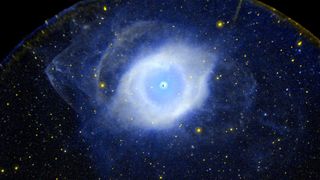
Astronomers use the light from distant stars, such as the Helix Nebula seen here, to measure the apparent expansion of the universe. New resaerch suggests there may be more to the pictue that we're not seeing. (Image credit: NASA/JPL-Caltech/SSC)
The expansion of the universe could be a mirage, a potentially controversial new study suggests. This rethinking of the cosmos also suggests solutions for the puzzles of dark energy and dark matter, which scientists believe account for around 95% of the universe's total energy and matter but remain shrouded in mystery.
The novel new approach is detailed in a paper published June 2 in the journal Classical and Quantum Gravity, by University of Geneva professor of theoretical physics Lucas Lombriser.
Scientists know the universe is expanding because of redshift, the stretching of light's wavelength towards the redder end of the spectrum as the object emitting it moves away from us.
The expansion of the universe could be a mirage, a potentially controversial new study suggests. This rethinking of the cosmos also suggests solutions for the puzzles of dark energy and dark matter, which scientists believe account for around 95% of the universe's total energy and matter but remain shrouded in mystery.
The novel new approach is detailed in a paper published June 2 in the journal Classical and Quantum Gravity, by University of Geneva professor of theoretical physics Lucas Lombriser.
Scientists know the universe is expanding because of redshift, the stretching of light's wavelength towards the redder end of the spectrum as the object emitting it moves away from us.
Distant galaxies have a higher redshift than those nearer to us, suggesting those galaxies are moving ever further from Earth.
More recently, scientists have found evidence that the universe's expansion isn't fixed, but is actually accelerating faster and faster. This accelerating expansion is captured by a term known as the cosmological constant, or lambda.
The cosmological constant has been a headache for cosmologists because predictions of its value made by particle physics differ from actual observations by 120 orders of magnitude. The cosmological constant has therefore been described as "the worst prediction in the history of physics."
Cosmologists often try to resolve the discrepancy between the different values of lambda by proposing new particles or physical forces but Lombriser tackles it by reconceptualizing what's already there. READ MORE...
More recently, scientists have found evidence that the universe's expansion isn't fixed, but is actually accelerating faster and faster. This accelerating expansion is captured by a term known as the cosmological constant, or lambda.
The cosmological constant has been a headache for cosmologists because predictions of its value made by particle physics differ from actual observations by 120 orders of magnitude. The cosmological constant has therefore been described as "the worst prediction in the history of physics."
Cosmologists often try to resolve the discrepancy between the different values of lambda by proposing new particles or physical forces but Lombriser tackles it by reconceptualizing what's already there. READ MORE...